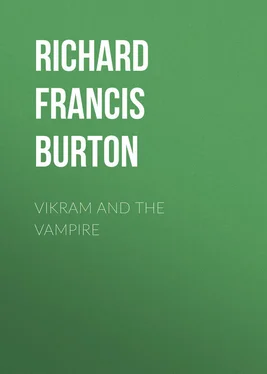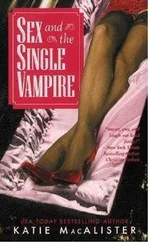Richard Burton - Vikram and the Vampire
Здесь есть возможность читать онлайн «Richard Burton - Vikram and the Vampire» — ознакомительный отрывок электронной книги совершенно бесплатно, а после прочтения отрывка купить полную версию. В некоторых случаях можно слушать аудио, скачать через торрент в формате fb2 и присутствует краткое содержание. Жанр: foreign_antique, foreign_prose, на английском языке. Описание произведения, (предисловие) а так же отзывы посетителей доступны на портале библиотеки ЛибКат.
- Название:Vikram and the Vampire
- Автор:
- Жанр:
- Год:неизвестен
- ISBN:нет данных
- Рейтинг книги:3 / 5. Голосов: 1
-
Избранное:Добавить в избранное
- Отзывы:
-
Ваша оценка:
- 60
- 1
- 2
- 3
- 4
- 5
Vikram and the Vampire: краткое содержание, описание и аннотация
Предлагаем к чтению аннотацию, описание, краткое содержание или предисловие (зависит от того, что написал сам автор книги «Vikram and the Vampire»). Если вы не нашли необходимую информацию о книге — напишите в комментариях, мы постараемся отыскать её.
Vikram and the Vampire — читать онлайн ознакомительный отрывок
Ниже представлен текст книги, разбитый по страницам. Система сохранения места последней прочитанной страницы, позволяет с удобством читать онлайн бесплатно книгу «Vikram and the Vampire», без необходимости каждый раз заново искать на чём Вы остановились. Поставьте закладку, и сможете в любой момент перейти на страницу, на которой закончили чтение.
Интервал:
Закладка:
Composed in Sanskrit, ‘the language of the gods,’ alias the Latin of India, it has been translated into all the Prakrit or vernacular and modern dialects of the great peninsula. The reason why it has not found favour with the Moslems is doubtless the highly polytheistic spirit which pervades it; moreover, the Faithful had already a specimen of that style of composition. This was the Hitopadesa, or Advice of a Friend , which, as a line in its introduction informs us, was borrowed from an older book, the Panchatantra , or Five Chapters . It is a collection of apologues recited by a learned Brahman, Vishnu Sharma by name, for the edification of his pupils, the sons of an Indian Raja. They have been adapted to or translated into a number of languages, notably into Pehlvi and Persian, Syriac and Turkish, Greek and Latin, Hebrew and Arabic. And as the Fables of Pilpay , 6 6 In Arabic, Bidpai el Hakim .
they are generally known, by name at least, to European littérateurs. Voltaire remarks, 7 7 Dictionnaire philosophique , sub v. ‘Apocryphes.’
‘Quand on fait réflexion que presque toute la terre a été infatuée de pareils contes, et qu’ils ont fait l’éducation du genre humain, on trouve les fables de Pilpay, Lokman, d’Ésope bien raisonnables.’
These tales, detached, but strung together by artificial means – pearls with a thread drawn through them – are manifest precursors of the Decamerone, or Ten Days. A modern Italian critic describes the now classical fiction as a collection of one hundred of those novels which Boccaccio is believed to have read out at the court of Queen Joanna of Naples, and which later in life were by him assorted together by a most simple and ingenious contrivance. But the great Florentine invented neither his stories nor his ‘plot,’ if we may so call it. He wrote in the middle of the fourteenth century (1344-8) when the West had borrowed many things from the East, rhymes 8 8 I do not mean that rhymes were not known before the days of El Islam, but that the Arabs popularised assonance and consonance in Southern Europe.
and romance, lutes and drums, alchemy and knight-errantry. Many of the ‘Novelle’ are, as Orientalists well know, to this day sung and recited almost textually by the wandering tale-tellers, bards, and rhapsodists of Persia and Central Asia.
The great kshatriya (soldier) king Vikramaditya, 9 9 ‘Vikrama’ means ‘valour’ or ‘prowess.’
or Vikramarka, meaning the ‘Sun of Heroism,’ plays in India the part of King Arthur, and of Harun El Rashid further West. He is a semi-historical personage. The son of Gandharba-Sena the donkey and the daughter of the King of Dhara, he was promised by his father the strength of a thousand male elephants. When his sire died, his grandfather, the deity Indra, resolved that the babe should not be born, upon which his mother stabbed herself. But the tragic event duly happening during the ninth month, Vikram came into the world by himself, and was carried to Indra, who pitied and adopted him, and gave him a good education.
The circumstances of his accession to the throne, as will presently appear, are differently told. Once, however, made King of Malaya, the modern Malwa, a province of Western Upper India, he so distinguished himself that the Hindu fabulists, with their usual brave kind of speaking, have made him ‘bring the whole earth under the shadow of one umbrella.’
The last ruler of the race of Mayúra, which reigned 318 years, was Rája-pál. He reigned 25 years, but giving himself up to effeminacy, his country was invaded by Shakáditya, a king from the highlands of Kumaon. Vikramaditya, in the fourteenth year of his reign, pretended to espouse the cause of Rája-pál, attacked and destroyed Shakáditya, and ascended the throne of Delhi. His capital was Avanti, or Ujjayani, the modern Ujjain. It was 13 kos (26 miles) long by 18 miles wide, an area of 468 square miles, but a trifle in Indian history. He obtained the title of Shakári, ‘foe of the Shakas,’ the Sacæ or Scythians, by his victories over that redoubtable race. In the Kali Yug, or Iron Age, he stands highest amongst the Hindu kings as the patron of learning. Nine persons under his patronage, popularly known as the ‘Nine Gems of Science,’ hold in India the honourable position of the Seven Wise Men of Greece.
These learned persons wrote works in the eighteen original dialects from which, say the Hindus, all the languages of the earth have been derived. 10 10 Mr. Ward of Serampore is unable to quote the names of more than nine out of the eighteen, namely: Sanskrit, Prakrit, Naga, Paisacha, Gandharba, Rakshasa, Ardhamágadi, Apa, and Guhyaka – most of them being the languages of different orders of fabulous beings. He tells us, however, that an account of these dialects may be found in the work called Pingala .
Dhanwantari enlightened the world upon the subjects of medicine and incantations. Kshapanaka treated the primary elements. Amara-Singha compiled a Sanskrit dictionary and a philosophical treatise. Shankubetálabhatta composed comments and Ghatakarpara, a poetical work of no great merit. The books of Mihira are not mentioned. Varáha produced two works on astrology and one on arithmetic. And Bararúchí introduced certain improvements in grammar, commented upon the incantations, and wrote a poem in praise of King Mádhava.
But the most celebrated of all the patronised ones was Kalidása. His two dramas, Sakuntala, 11 11 Translated by Sir Wm. Jones, 1789; and by Professor Williams, 1856.
and Vikram and Urvasi, 12 12 Translated by Professor H. H. Wilson.
have descended to our day; besides which he produced a poem on the seasons, a work on astronomy, a poetical history of the gods, and many other books. 13 13 The time was propitious to savans. Whilst Vikramaditya lived, Mágha, another king, caused to be written a poem called after his name. For each verse he is said to have paid to learned men a gold piece, which amounted to a total of 5,280 l. – a large sum in those days, which preceded those of Paradise Lost . About the same period, Karnáta, a third king, was famed for patronising the learned men who rose to honour at Vikram’s court. Dhavaka, a poet of nearly the same period, received from King Shriharsha the magnificent present of 10,000 l. for a poem called the Ratna-Malá .
Vikramaditya established the Sambat era, dating from A.C. 56. After a long, happy, and glorious reign, he lost his life in a war with Shalivahana, King of Pratisthana. That monarch also left behind him an era called the ‘Shaka,’ beginning with A.D. 78. It is employed, even now, by the Hindus in recording their births, marriages, and similar occasions.
King Vikramaditya was succeeded by his infant son Vikrama-Sena, and father and son reigned over a period of 93 years. At last the latter was supplanted by a devotee named Samudra-pála, who entered into his body by miraculous means. The usurper reigned 24 years and 2 months, and the throne of Delhi continued in the hands of his sixteen successors, who reigned 641 years and three months. Vikrama-pála, the last, was slain in battle by Tilaka-chandra, King of Vaharannah. 14 14 Lieut. Wilford supports the theory that there were eight Vikramadityas, the last of whom established the era. For further particulars, the curious reader will consult Lassen’s Anthologia , and Professor H. H. Wilson’s Essay on Vikram , (New) As. Res. ix. 117.
It is not pretended that the words of these Hindu tales are preserved to the letter. The question about the metamorphosis of cats into tigers, for instance, proceeded from a Gem of Learning in a university much nearer home than Gaur. Similarly the learned and still living Mgr. Gaume ( Traité du Saint-Esprit , p. 81) joins Camerarius in the belief that serpents bite women rather than men. And he quotes (p. 192) Cornelius à Lapide, who informs us that the leopard is the produce of a lioness with a hyæna or a pard.
Читать дальшеИнтервал:
Закладка:
Похожие книги на «Vikram and the Vampire»
Представляем Вашему вниманию похожие книги на «Vikram and the Vampire» списком для выбора. Мы отобрали схожую по названию и смыслу литературу в надежде предоставить читателям больше вариантов отыскать новые, интересные, ещё непрочитанные произведения.
Обсуждение, отзывы о книге «Vikram and the Vampire» и просто собственные мнения читателей. Оставьте ваши комментарии, напишите, что Вы думаете о произведении, его смысле или главных героях. Укажите что конкретно понравилось, а что нет, и почему Вы так считаете.












